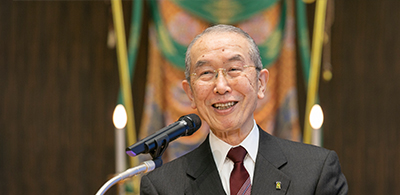The Joy of Having Something to Believe In —Concentration
September 2022

Does Losing Our Composure Disqualify Us as Bodhisattvas?
We learn the teachings of the Buddha, use our compassionate minds to be considerate of others, and strive to grow as human beings through such practices. These are called “bodhisattva practices” and are summed up as six guiding objectives in the teaching known as the Six Paramitas. One of these six, concentration, was explained by Founder Niwano as indicating “a state of mind determined to always follow the truth” and “a quiet, calm state of mind that does not doubt or get upset, no matter what happens.” Therefore, concentration is a state of mind expected of all bodhisattvas, rather than a guideline for our behavior.
Is it possible, though, to have such a settled frame of mind, no matter what happens? And if we are unable to do so, are we disqualified as bodhisattvas? Because we are human beings, it is extremely difficult to never have doubts or become upset. If our minds become unsettled, in my understanding, this does not mean that we are disqualified as bodhisattvas.
Every day, we encounter various people and events. According to the teaching of impermanence, every moment is part of a series of new encounters full of productivity and change. During that process, we may sometimes get upset or lose our composure. Although we all have minds of tranquility, like the Buddha’s, our minds are sometimes unsettled by anger or greed; because we are only human, I think it is important that we fully accept this fact. Only by squarely facing the reality that our minds are sometimes unsettled can we aspire to attain an unperturbed state of being and want to grasp something that we can trust from the bottom of our hearts. In fact, many of you have connected with the Dharma in this way, haven’t you?
So, the fact that we human beings have doubts and worries is important. If something shakes up our minds, it is proof that we are alive. If we can fully accept such events and be grateful for having received a life as a human being—capable of seeking the truth (the Dharma)—then this acceptance itself is one bodhisattva-like level of concentration in which our minds are determined to “follow the truth.”
Seeing the Moon of the Truth
To quote a Buddhist poem by Zen master Ikkyu (1394–1481), “In a cloudless sky, / A single moon / Shines brightly, / And yet we get lost / In the darkness of this floating world.” Just as the moonlight helps us walk at night, so the moon of the truth always illuminates us. Nevertheless, those who do not look for the truth live with anxiety, impatience, and fear constantly in their minds, as if they are groping along as they walk through the dark night.
Shortly before his death, Shakyamuni expounded the teaching “Make yourself the light; make the Dharma your light,” which means “believe in the truth and depend on yourself as you follow that truth. Take refuge in the Dharma.” We could say this aphorism is like the moonlight that helps us walk at night. In other words, it is important to make a habit of trying to match your behavior and the issue before you with fundamental truths—such as “all things are in a state of constant change,” and “all things arise through causes and conditions.” If doing so makes your mind even a little calmer and more at ease, it will lead to relief from anxiety and suffering.
Zenjo, the Japanese word for “concentration”—by which we mean a calm, settled state of mind—is generally understood as the peaceful state of mind achieved through meditation. There are many kinds of meditation and concentration, but I believe that the key is to take a good look at your current behavior and the reality in front of you, accept them, and make every effort to focus your mind on the truth. And then, that this practice is simply explained by the teaching “Make yourself the light; make the Dharma your light,” and that we have encountered it as well as a faith that always puts our minds at ease, is something for which we truly feel joy.
The season of moon-viewing is now upon us. And though we are all bathed in the same moonlight, there are people who cannot live peaceful lives. The many practices of benefitting others described in the Six Paramitas, the first of which is the practice of donation, help us to shine the light of compassion into the minds of those who need it most. Our concentration—our admiring the moon of the truth—is a bodhisattva practice that forms the basis for doing so.




